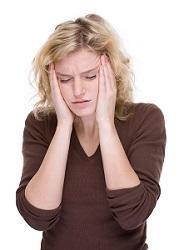Have you ever woken up with a stiff, painful jaw and wondered what happened during the night? Although occasional jaw pain isn't unusual, persistent jaw pain can be a sign of an oral health problem, such as temporomandibular joint disorder (TMJ). Rick Rubin, D.M.D. and Brett Dunnill, D.D.S., your Williamsburg,VA, dentists, are here to share several common causes of jaw pain.
An abscessed tooth
Gum disease, injuries and tooth decay can cause a bacterial infection in or around a tooth called an abscess. Pain from the abscess may extend from your tooth to your jaw. If your jaw pain is accompanied by facial swelling, a fever, and swollen lymph nodes, you may have an abscess. Because the infection in your mouth can spread to other parts of your body, abscesses require prompt treatment
Grinding
If your teeth don't meet together perfectly or you're stressed, you may grind or clench your teeth. Grinding or clenching puts significant pressure on your jaw joint and the surrounding muscles. Since this happens during sleep, you may not be aware that you have the problem. Waking up with jaw pain and a headache can be signs of the problem.
TMJ
TMJ causes pain in the bones and muscles in your jaw joint. The disorder can occur if you've experienced a blow or injury to your jaw, arthritis or bite problems. In many cases, the cause is unknown. If you have TMJ, you may experience any of these symptoms:
- Pain in your jaw that radiates to your face or neck
- Pain around your ears and temples
- Jaw stiffness
- Clicking or popping sounds when you open or close your mouth
- Pain when you bite, chew or yawn
- A change in way your teeth fit together
- Temporary or permanent locking of your jaw
How can my dentist help?
Treatment of your jaw pain depends on the cause. If you have an abscess, you'll need antibiotics to kill the bacteria and additional treatments to address tooth decay or gum disease. A custom-made nightguard offers a simple way to prevent grinding and clenching.
Ice, heat, and over-the-counter pain medications are often helpful in relieving TMJ pain at home. If these remedies don't work, your dentist can offer several treatments that may help you feel better. Prescription pain medications, muscle relaxants, and cortisone injections can help ease the pain. If your dentist suspects that bite issues are the cause of your problem, braces may be recommended to correct alignment problems. In some cases, your dentist may recommend that you wear a bite guard at night. The guard reduces pressure on the jaw joints while you sleep.
Contact your Williamsburg Dentist About TMJ
Are you concerned about your jaw pain? Visit Rick Rubin, D.M.D. and Brett Dunnill, D.D.S., your Williamsburg,VA, dentists, for a complete dental evaluation. Call them at (757) 345-5500 to schedule an appointment. End your jaw or TMJ pain with a visit to your Williamsburg dentists!
